82 Years Ago, Clark Marries His Second Wife…For the Second Time?
It was 82 years ago today that 30-year-old Clark Gable married 47-year-old Maria “Ria” Franklin. According to the press at the time, it was a repeat ceremony because the one that had been performed months earlier in New York was suddenly discovered to be invalid in California. Well at least, that’s the way it was spun to the public…
In many ways, it was easier to be a star back then. The studio assigned you your films, your co-stars, dictated your schedule; they covered up your affairs, paid off columnists to shoo away divorce rumors and personal scandals, and made sure the pictures of you that were published were only your very best. You were protected.
On the other hand, you were also shackled—by the studio and by the time period itself. This studio system affected the life of most of its stars dramatically—personal choices that most would take for granted were whisked away. If you were gay, your studio set you up on dates with its newest starlet and planted marriage rumors in the columns. If rumors started flying that you were shacked up with someone or had gotten someone pregnant, you’d better believe wedding bells would be ringing as soon as possible. There was a morality clause in that contract you signed and your studio never let you forget it.
In the first contract Clark signed with MGM in 1931, the morality clause read as follows: “The artist agrees to conduct himself with due regard to public conventions and morals and agrees that he will not do or commit any act or thing that will tend to degrade him in society, or bring him into public hatred, contempt, scorn, or ridicule, or that will tend to shock, insult or offend the community or ridicule public morals or decency or prejudice the producer or the motion picture industry in general.” And that very morality clause is the direct cause for Clark’s second marriage.
Maria “Ria” Franklin Langham, a wealthy Houston socialite, had recently ended her third marriage and moved to New York with her two children to start anew when she happened upon this unknown thespian Clark Gable in 1928.
Ria’s daughter Jana claims she and a friend saw Clark when he was part of a stock company performing in Houston and developed big crushes on him. When the family moved to New York, Jana discovered Clark was there too and took her mother with her to see him in the play Machinal. Ria’s half-brother, Booth Franklin, was an actor as well and offered to take them backstage to meet Clark after the show. It was then that Ria first set her eyes on Clark and decided he would make a nice protégé. Ria fell madly in love with Clark from the start and began to groom him, picking out stylish clothes for him to wear, teaching him social graces. He enjoyed the attention she flourished on him and saw her as elegant and worldly. For the first time in his life he had nice clothes, rode around in a nice car, had a tuxedo with a top hat. He attended society parties and golf outings with the New York social elite. It was a far cry from him and first wife Josephine scraping pennies together to go to the movies. People like to say that young, unpolished Clark used wealthy socialite Ria for her money and connections. I believe that they used each other. He did need money. And she very much relished the idea of being on the arm of this strapping young actor that all the girls were fawning over.
1929 is when the status of their relationship begins to get murky. Ria began to insist on marriage, but Clark was already married–to Josephine Dillon, who kept saying that she did not believe in divorce and would not free him to become a part of what she called a “step up marriage.”
In February 1929, Clark took a train from New York to Los Angeles to see Josephine. Ria had had her lawyer draw up papers for a Mexican divorce, which was the quickest way out in those days. Josephine refused, claiming that she didn’t trust Mexican divorces. On March 30, 1929, she filed for divorce on her own terms, citing desertion, in California. By California law it would be a year for the divorce to be final.
So, if they had to wait a year, that would mean that the earliest that Clark could have legally married Ria was in April of 1930. But in 1929, Clark and Ria were signing hotel registers as “Mr. and Mrs. Clark Gable”—a ruse just so they could stay in the same room, perhaps? In some places it has been reported that Josephine did indeed sign those Mexican divorce papers after she filed in California, when Clark became angry at the year’s waiting time, and therefore they were married in 1929. But that couldn’t be true, as Josephine’s filing was never cancelled, and the effective date of their divorce is listed as March 30, 1930–a fact that Clark would clearly know. There has also never been a marriage certificate pop up citing a marriage between Clark and Ria in 1929 or 1930. Ria seems to be a very practical woman and would surely keep such a document. Also, no biographer in the decades since has been able to find one in any eastern city. Ria’s own daughter, Jana, admitted later to not even knowing the date. “They were married by a judge or something, in the east,” she said.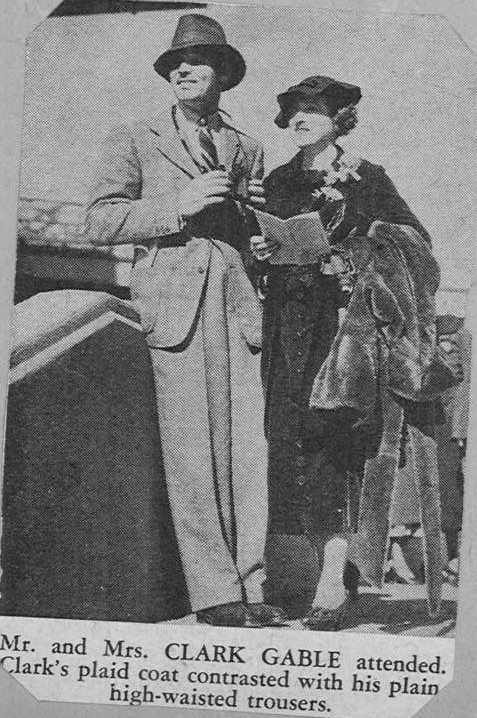
Paul Fix, who was a stage actor with Clark in those days, recalled being puzzled by Clark and Ria’s relationship. “I don’t think they were married. He was furious when Ria followed him west. Callous though it may sound, I think that Clark decided he really didn’t need her anymore…he wanted to dump her. But a decent streak in Clark made him feel that he owed Ria something for all that she’d done for him. So he stayed with her and tried to keep her happy.”
Legally married or not, Clark and Ria were Hollywood bound. Hollywood wasn’t quite what Ria had envisioned, however. Instead of being the girl on the arm of the rising star, Clark was vanishing right before her eyes. As his career began to explode in early 1931, he was seen around town with several of his costars and would often not come home to their shared apartment–sometimes for days. He had even already been quoted in a few interviews saying he was not married.
Ria grew more and more irritated as the months wore on and finally decided to take matters into her own hands. She went directly to MGM, where her plight was directed to public relations chief Howard Strickling. She told him, crying, that they had been living together for years and that Clark had promised to marry her but now wanted to dump her. She was devastated at what that would do to her reputation and said that if he did dump her she would be “forced” to tell her story to the fan magazines and newspapers. Strickling, knowing the scandal would ruin the career of his rising star, agreed that they should be married as quickly as possible. Clark hesitated, until Strickling and MGM producer Irving Thalberg waved his contract in his face, which included that morality clause. Living with a woman who was not his wife was in direct violation and if the public found out, his career would come to an abrupt end. Clark had no choice but to agree.
Now, of course the situation would have to be spun–and fast. Up until this point MGM had been pretty mum for the most part on whether Clark was married or not. There was already a lot of gossip that Clark had two or three ex-wives and several children in boarding schools across the country. The last thing MGM needed was a reporter snuffing out that their newest star had they had been living in sin with a woman in an apartment in Hollywood–a widow with two children, no less! Not to mention that Clark and Ria had been registering at hotels as “Mr. and Mrs. Gable” for the past few years. To avoid confusion over the marriage, MGM put out a statement that their publicity department has discovered that when Clark and Ria originally married Clark’s divorce from first wife Josephine was not final, thus their marriage was not legal and they had to get married again.
They were “re”married on June 19,1931 at a courthouse in Santa Ana, California, in the judge’s chambers. Reporters flocked to the scene and shouted questions at them as they exited. Neither answered and solemnly walked to their waiting car together. Ria burst into tears in the car. Not exactly jubilant newlyweds, huh?
Now that the scandal was avoided and the dust was cleared, I imagine that MGM was not too pleased that their newly minted “Hollywood he-man” came with an older, rather matronly wife. I’m sure they would have much rather had him single, and paired him with every new starlet in their roster to boost both careers. But MGM made the best of it. Story after story printed of how “in love” the Gables were, what a doting stepfather Clark was, etc. They even tried to lower the age of Ria and her children, and always described Ria as “beautiful, glamorous and sophisticated.” Any rumors of them separating (and they began nary a month after the wedding!) were quickly squashed by MGM publicity. If Clark had to be a married man, he was going to be a HAPPILY married man, if MGM had their way.
This 1932 article calls for sympathy for Mrs. Gable:
The story behind the scenes was far from the portrait MGM painted. Whatever relationship Clark and Ria had before their forced marriage, it was strained to say the least following the ceremony. Clark was angry at what she had done. I suppose he understood her reasoning in a way—I think he did realize that perhaps he “owed” her the marriage, but that didn’t make this cornered bear feel any better. Clark had new fame, new money, an exploding career and Ria was like an anchor he had to drag around on a chain behind him. He dutifully appeared at film premieres with Ria on his arm, waving at crowds. 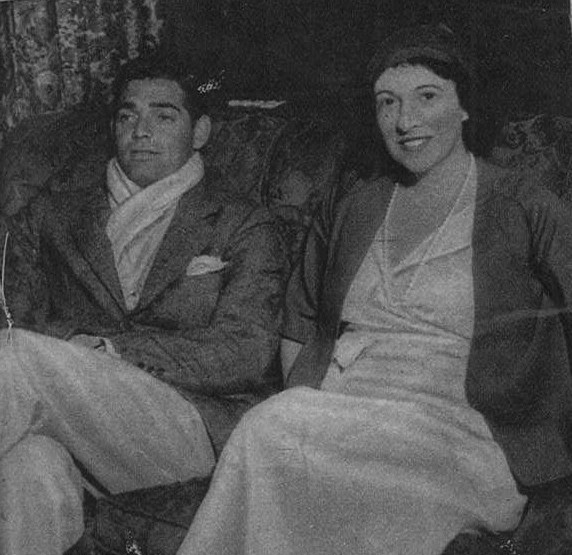 He did interviews with fan magazines, always mentioning Ria only delicately, giving her credit for being a good wife occasionally, but never oozing with love and adoration. Meanwhile, Clark and Ria were sleeping in separate rooms, across the house from each other. He was always staying late at the studio or not coming home at all. Hidden from the fans by a protective press, Clark was carrying on several affairs with co-stars: Anita Page, Marion Davies and Elizabeth Allan, to name a few. Not to mention the notorious affair with Joan Crawford that everyone in Hollywood knew about…but kept quiet.
He did interviews with fan magazines, always mentioning Ria only delicately, giving her credit for being a good wife occasionally, but never oozing with love and adoration. Meanwhile, Clark and Ria were sleeping in separate rooms, across the house from each other. He was always staying late at the studio or not coming home at all. Hidden from the fans by a protective press, Clark was carrying on several affairs with co-stars: Anita Page, Marion Davies and Elizabeth Allan, to name a few. Not to mention the notorious affair with Joan Crawford that everyone in Hollywood knew about…but kept quiet.
The whispers surely hit Mrs. Gable’s ears, but Ria was a proud woman and did them no mind. She enjoyed being Mrs. Gable and all the perks that came with it. Ria and her two children even took a train around the country, waving to fans of Clark’s. She gave interviews depicting their perfect family life and sharing recipes for the things Clark liked to eat. To the American public, the Gables had a perfect marriage, and Ria was confident that, despite what he was doing all those nights he wasn’t at home, that he would always return to her.
The straw that broke the camel’s back was Clark’s brief fling with Loretta Young in 1935 while on location for Call of the Wild. It wasn’t too long after Clark learned of Loretta’s pregnancy that he finally moved out of the Brentwood home he shared with Ria, and into the Beverly Wilshire Hotel. Loretta’s condition was kept secret (for about 60 years!) but the fan magazines fed fans a steady diet of “oh no, how could this have happened to such a wonderful couple who were so perfect together” stories following the Gables’ separation. Ria felt vindicated by these stories, knowing the public was on her side.
This rather ridiculous article, written by Adela Rogers St. Johns ( a friend of Clark’s who knew full well of his numerous affairs) tops the charts as far as syrupy eulogies to their marriage.
The parting of the Gables makes my heart ache a little. I think it does yours, too. Because they were in love with each other, those two. And I know that they expected to live out their years side by side, with love and laughter and courage. I’ve listened to them, in the serene and lovely home Rhea Gable had created, planning things they were going to do, places they were going to see, books they were going to read – always together. Now they are planning to go separate ways and you can see the heartbreak in Clark’s eyes. Because even with all the other women there are in the world, even if a man were the screen’s great lover, it would be dreadful to wake up in the morning and think you’d lost Rhea – because there aren’t any other women like Rhea, at least none I’ve ever met. Why? Why did it have to happen? Why did two such swell people, both of them real, both of them fine, both of them deserving of happiness, have to come to the end of what seemed to all of us who knew them well, all of us who’d been close friends, an ideal marriage? I’ve been sitting here looking out at trees that are bare, but that will be green again in the spring, at lilac bushes that today are brown twiggs but that in April will be fragrance and beauty and color once more, and trying to figure it out. You see, it was like this with the Gables – you felt a wholeness of self when they were together. You felt that they presented a united front to the world and therefore they were safe. I’ve so often noticed them at parties. Maybe they’d be separated the length of a room, the length of a dinner table. Maybe Rhea, stately and elegant in black, would be playing bridge and Clark would be spinning yarns with a gang of men. But every once in a while their eyes would meet in an exchange of sweet understanding, a moment’s greeting, that said, “I’m having such a good time because I know you’re here, in the same room, that we see little things, and laugh over little jokes that belong just to us, and that when the party is over, we’ll go home together to our own home. That’s what really makes everything so nice.” They weren’t sentimental or gushing. They were too modern for that, too casual, as is the fashion nowadays. But your heart felt a little warmer because they were joined in their own way, and the world is often a lonely place and men and women were meant to be one, so that loneliness would roll back like a wave and stand trembling at the command of love. Now the Gables are parted, there’s going to be a divorce.
That was Adela, doing her job, giving the public their fluff and biting her tongue. I have always wondered if the American public bought the whole thing. Probably not.
All that changed when a certain Miss Carole Lombard entered the picture the following year. Fans went nuts for this pairing of Hollywood’s favorite screwball beauty and it’s favorite He-Man. Clark and Carole were pictured everywhere together: the circus, the MGM picnic, premieres, at the horse races, at parties. And these weren’t the somewhat stoic premiere pictures that Clark and Ria had posed for—these were lovey dovey puppy love shots of them arm in arm, often gazing into each other’s eyes. Much to Ria’s surprise, the public turned on her. She was no longer the “poor Mrs. Gable who was left by her loving husband”—she was now the stubborn older wife standing in the way of Clark and Carole’s true love.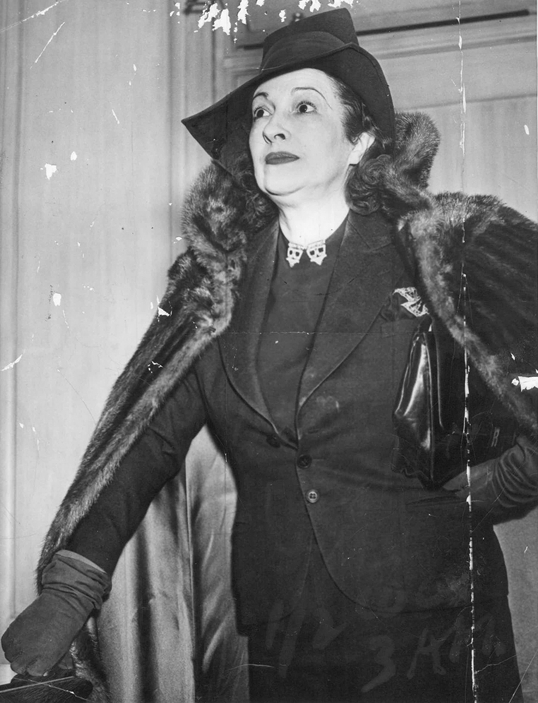
In the story of the Clark Gable-Carole Lombard romance, Ria is often painted as this villain who would not consent to a divorce just out of sheer bitterness. Sure, maybe Ria was a bit bitter, but I don’t think she was a villain. She had a husband, a famous one, and she didn’t want to give him up. I think by the time of the divorce was granted in 1939, Ria was probably not really “in love” with Clark anymore, but it was more of an issue of “this is my property and I have earned it.” Ria was also a woman who had made a career out of marrying wealthy men (see also Clark’s wives #4 and #5) and so she wasn’t going to let go without what she considered he owed her. Once she knew that Carole had taken over Clark’s heart and he wouldn’t return, she at least wanted money as she shuffled out of the picture.
Clark and Ria were finally divorced in March 1939 (after Clark was able to pay Ria off with a bonus he received from signing on for Gone with the Wind) and Clark swiftly married Carole Lombard a few weeks later.
As for Ria, she stayed around in Hollywood for a while, even dating George Raft for a bit. Then she retired to Houston, where she died in 1966.
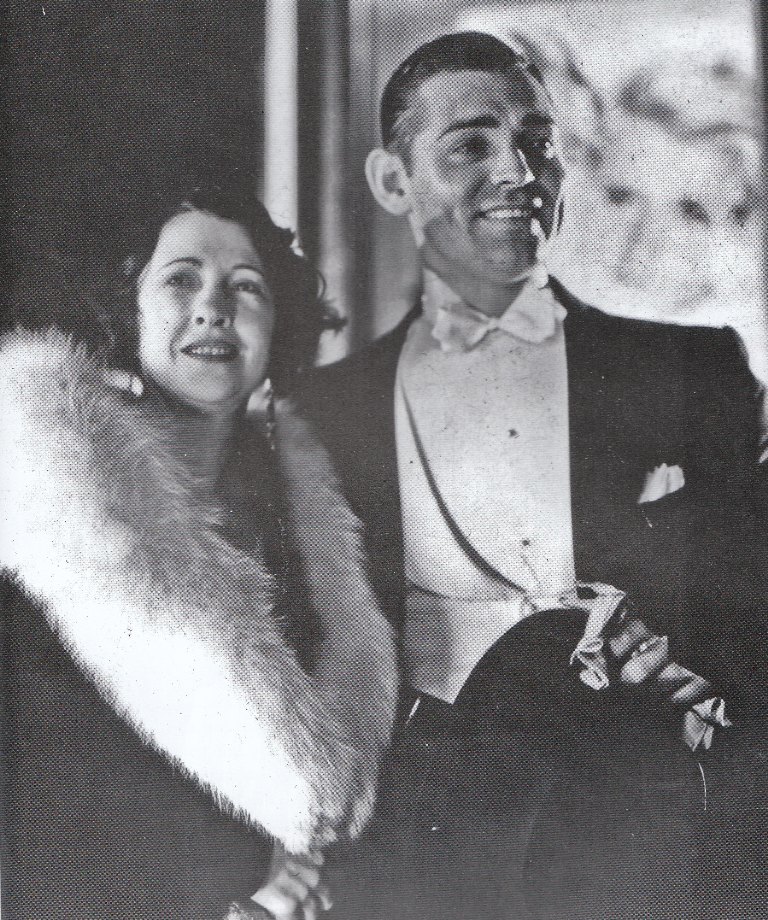
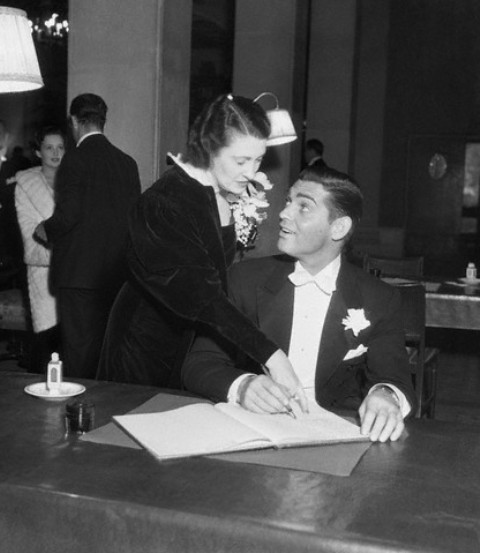
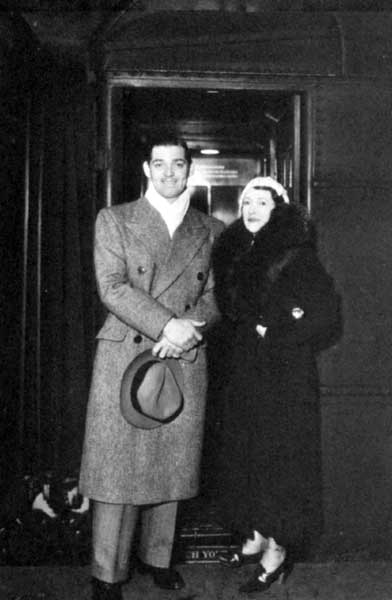
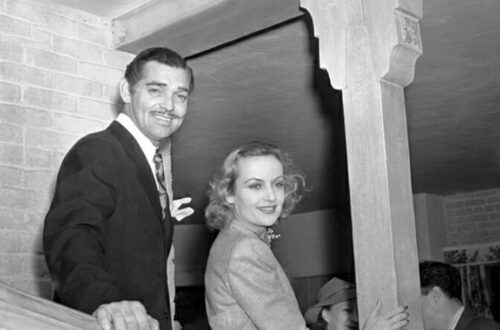
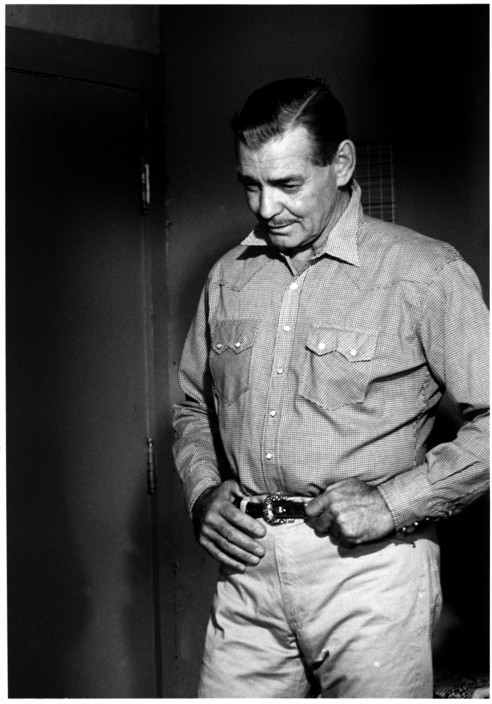
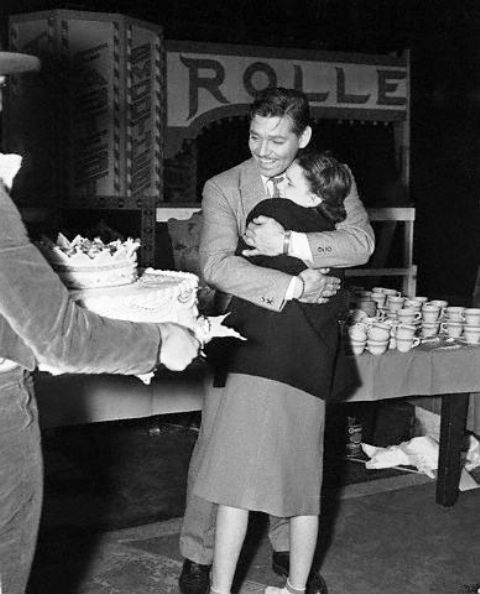
7 Comments
Coco B
The portrayal of Clark’s relationships with Josephine and Ria has always bothered me. He usually gets the short end of the stick, often portrayed as somewhat ungrateful. And for the longest time I always felt sorry for Josephine and Ria. Not so anymore. Maybe age and experience have enlightened me. Josephine married him for convenience, but whose? Hers just as much as his. What nobody mentions is that her claim to fame is Clark. Josephine went down in history as the person who taught Gable to act. That is no small claim to fame because Gable was a good actor. The same with Ria, she bought herself a boy toy and married him to keep him. But who would have ever known who Maria Langham was without Clark. She opened the door to high society for him but without his natural grace and charm it would have made no difference how many tuxedos and top hats she bought. So in my old age, (47) I’m cutting Clark some slack.
Athena Pools
Then it’s all about the money and fame why Ria kept holding on to Clark until the divorce is settled. It’s not easy to let go of such fine man but Carole deserved Clark.
admin
I think in the end, yes. In the end it was all about her “winning.” Theirs was never some passionate affair. She was probably in love with him at one time, but I think by the end it was just a matter of her saving face.
admin
Clark tends to be painted as the bad guy in both marriages, but really, as you said, Josephine and Ria used him too. Josephine remained a drama coach in LA until her death and always proclaimed she was the one who created Clark Gable, telling everyone she was his first wife. She was constantly in magazines, writing articles about how she groomed Clark for stardom. I doubt she would have had much of a career without using his name to open doors for her.
Coco B
I wasn’t sure if Josephine used her claim to fame later in her career but if she did or didn’t Clark Gable made her just as famous as she made him.
I wonder who some of her other students were?
Kristi Jowell
You must remember Ria already HAD money though! She was born with a silver spoon in her mouth. My grandmother worked in Houston for Ria’s step-father, he was a prominent doctor. So, she was just enjoying having a young, handsome, POPULAR man, that all the women wanted!
Jodi
The first two wives get none of my sympathy, but are deserving of some respect and plenty of credit. Both were miles above Clark in age, experience, maturity, sophistication and education when they took him on as a protégé as one adopts a stray puppy in need of nourishment and intensive training just to survive in the business he was determined to break through. To even suggest they were seduced or conned would be laughable. Dillon was a Stanford graduate who had much of her stage training in Europe, while Ria had lived almost a full life with her widowhood, divorces, and the raising of three children. Clark was a high school dropout moving from troupe to troupe begging reluctant managers for work, any work, just to get him close to a stage. No talent, no skills, no money, rotting teeth, large ears, almost nothing but work ethic to recommend him. He needed ALL the help he could get in every department except the natural charm and boyishness that made women love him and want to take care of him. He genuinely valued Dillon’s expertise and Ria’s sophistication as none other. He wanted it for himself, never them. And they should have known that.
When someone freely gives you power, don’t be surprised when he just as freely takes it away. Don’t feel scorned when the boy you’ve adopted becomes a man and starts behaving like one. What he gained from them was invaluable, but their relationship was hardly fit for matrimony. Convention and contract demanded it, however, and so he played by the rules to ensure that he never again worked at another oil field or lumber mill.